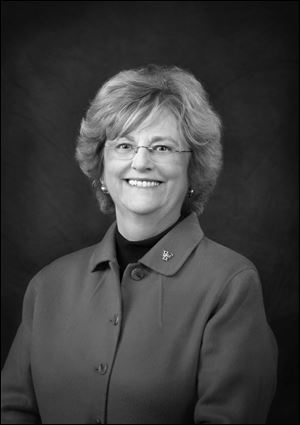
GUEST COLUMN
Liberal arts are still the heart of higher education
A liberal-arts education provides the basis for the problem-solving skills that are essential to lifelong learning
3/2/2014
Mazey
With the increasing need for an educated work force, America’s future hinges on its ability to provide an affordable and high-quality education for our citizens. Our nation’s economy and even our democracy depend on it.
How can we ensure we have this educated population? Colleges and universities are individually and collectively working on this important issue. Bowling Green State University and similar universities strive to educate the whole individual, and to prepare our students to meet the multiple demands and challenges of the future.
These demands will require adaptive learning over several different careers in an individual’s lifetime. In this age of technology, all of our citizens must be constantly learning, to keep abreast of the changing economy.
At the heart of all higher education is a strong liberal-arts component. Although there is an increasing emphasis on professional disciplines and majors to prepare students for their first careers, a liberal-arts core education provides the basis for the analytical, problem-solving, and critical-thinking skills that are essential to lifelong learning.
College students who major in an applied field such as health care, business, or technology are well-served to have not only specialized expertise in their discipline but also a strong liberal-arts core. The long-term value of a liberal-arts education that includes the sciences, mathematics, and the humanities must not be underrated.
Social sciences such as psychology and political science also contribute to key critical-thinking skills, and provide a strong basis for the work force and democracy we cherish. The liberal-arts curriculum gives a student the skills he or she needs to work with people and create lifelong learning that ensures success in multiple careers.
Equally important to the development of the whole, well-educated individual is experience. Service learning and internship experiences enhance the foundation of a liberal-arts education. BGSU now guarantees every student an experiential learning opportunity before graduation.
Recently published data indicate four out of five employers agree that all students should acquire knowledge in the liberal arts and sciences. In addition, 93 percent of employers agree that candidates who demonstrate the capacity to think critically, communicate clearly, and solve problems possess the skills that are more important to future career success than a specific undergraduate major.
Employers also believe that to advance in a company and enjoy long-term success, employees must have a broad range of knowledge and skills along with learning specific to their field.
For students who graduate with liberal-arts and social-science majors, recently released data by the Association of American Colleges and Universities indicate that the “earnings gap between those with a baccalaureate degree in a humanities or social-science field and those with a baccalaureate degree in a professional and pre-professional field closes over time.” The study concludes that “mature workers who majored in a humanities or social-science field earn on average about $2,000 more than those who majored in a professional or pre-professional field.”
A liberal-arts education with a strong leadership foundation will be the key to success in a lifetime filled with multiple careers. Work-force leadership in the public, private, and nonprofit sectors is based on an understanding of how any organization works as a system. That system can prosper by seizing its opportunities and building on its strengths, overcoming its weaknesses, and mitigating its threats.
A skilled leader, in addition to being a strong strategic thinker, must embody excellent problem-solving, analytical, and communication skills to ensure she or he has the capacity to foster prosperity for the organization. A solid liberal-arts education builds leadership skills, and leadership skills are built on a strong liberal-arts education.
The two go hand in hand. They become the key components of a labor force of the future that can meet the challenges of a rapidly changing technological society, in this country and beyond.
Mary Ellen Mazey is president of Bowling Green State University.